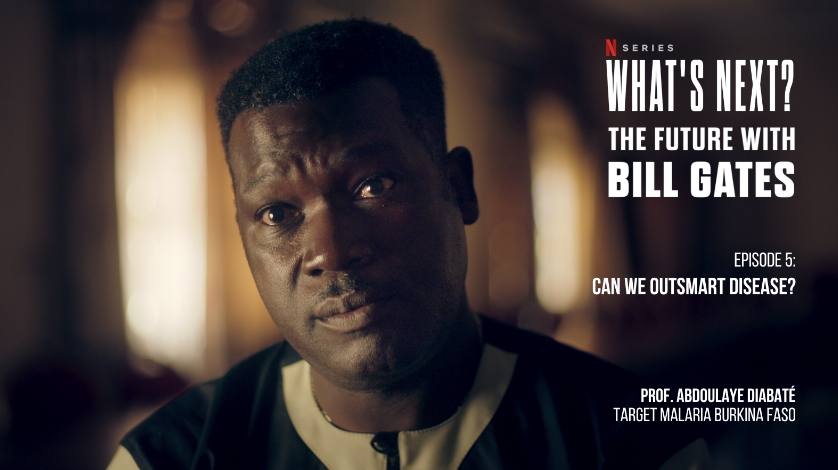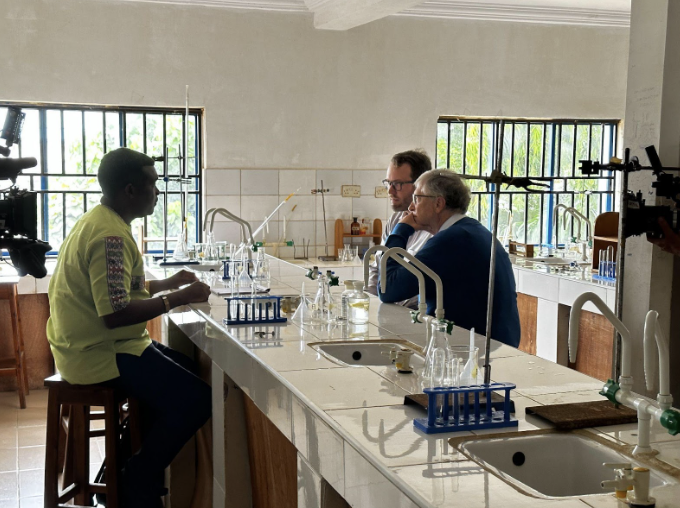OUAGADOUGOU, Burkina Faso, 2 October 2024 -/African Media Agency(AMA)/- As an African scientist deeply invested in malaria research, Professor Abdoulaye Diabaté, Head of Medical Entomology and Parasitology at the Research Institute in Health Sciences in Bobo-Dioulasso, Burkina Faso, and Principal Investigator of Target Malaria Burkina Faso, was recently featured in a Netflix series called ‘What’s Next? The Future With Bill Gates.’
The documentary series is an incredible platform to show how Professor Diabaté, Target Malaria and the Bill & Melinda Gates Foundation are bringing science and philanthropy together to foster creativity, innovation, and sustainable solutions for the advancement of global health, and more importantly the malaria crisis in Africa.

Episode 5, ‘Can We Outsmart Disease?’ directed by Alex Braverman, focuses on the history of malaria and current efforts to find new strategies in Africa, such as vaccines, monoclonal antibodies and genetically modified mosquitoes. In the episode, Professor Diabaté has a frank conversation with Bill Gates pointing out that if malaria was killing 600,000 people in the USA or Europe, the problem would have completely changed by now.

“Malaria is tightly linked to poverty, and it is incredibly expensive to be poor. Two hundred million cases worldwide end up every year with approximately 600 000 deaths. Most of these deaths happen in Africa where children and pregnant women pay the highest price,” says Diabaté. “I want to bring global awareness to the impact the disease has on livelihoods and economies while ensuring that African voices and expertise play a central role in the development and evaluation of innovative technologies.”
Malaria’s impact on Africa
The World Health Organisation (WHO) reported that, in 2022, Africa was home to 94% of malaria cases (233 million) and 95% (580 000) of malaria deaths. Children under five accounted for about 78% of all malaria deaths.
Earlier this year, Professor Diabaté took the stage at TED talking about his firsthand experience with malaria, a personal motivator to his tireless efforts to develop new tools to fight the disease in Africa.
The Economic Impact of Malaria
Malaria No More (MNM) United Kingdom (UK) commissioned Oxford Economics Africa to assess the future economic impact of malaria on the countries most exposed to the disease, as well as at Africa and global levels. The report “The Malaria Dividend” demonstrates that the potential global economic gains of realising the SDG targets in all malaria-endemic countries could significantly boost the GDP of malaria-endemic countries by US$142.7 billion.The research also showed reaching this goal could generate an additional $31bn in exports to some of the most affected malaria endemic countries in Africa; with an almost $4bn rise for G7 countries.
Funding, innovation and capacity building
According to a new report by the Global Fund, investments in the fight against HIV, tuberculosis (TB) and malaria have saved a total of 65 million lives and cut the combined death rate from the three diseases by 61% since 2002. The Global Fund accelerated the equitable deployment of tools for prevention, testing and treatment, including the distribution of 227 million mosquito nets, the testing of 335 million suspected malaria cases, and the treatment of 171 million malaria cases.
The need for new tools
Despite these advances, progress in the malaria fight has stalled with 5 million new cases in 2022 compared to 2021. A series of factors include: resistance from mosquitoes against the most common insecticides, resistance from the parasite against artemisinin-based combination therapies (the current best available drugs), climate change affecting the spread of malaria mosquitoes, and mosquitoes changing biting behaviours. The WHO noted that continued investment in the development and deployment of new malaria vaccines and next-generation tools will be key to achieving the 2030 global malaria targets.
The future of gene drive technology
“There’s more money put into baldness drugs than malaria. I was shocked when I saw how little money was going into malaria research,”says Bill Gates in the episode.
Target Malaria is pioneering the use of gene drive, a natural genetic mechanism, to spread a genetic modification in malaria mosquitoes that biases the rate of inheritance and affects their ability to reproduce. This innovative approach holds the promise of being a sustainable and cost-effective method to reduce the population of malaria mosquitoes and ultimately halt malaria transmission in the future.
“We don’t have gene drive mosquitoes in Africa yet, for many reasons. There are many things that must be in place to make sure you have something solid, and safe for the community and its environment,” added Prof Diabaté.
“It would be one of mankind’s biggest achievements to finish off malaria,” concluded Bill Gates.
The documentary premiered on September 18th, on the streaming site Netflix.
For more information:
Netflix documentary series:
https://www.netflix.com/fr-en/title/81609333?trkid=258593161&s=i&vlang=en
Prof. Abdoulaye Diabaté’s blog post about the show: https://targetmalaria.org/latest/news/finishing-off-malaria-my-conversation-with-bill-gates/
Distributed by African Media Agency (AMA) on behalf of Target Malaria.
About Target Malaria
Target Malaria is a not-for-profit research consortium that aims to develop and share new, cost-effective and sustainable genetic technologies to modify mosquitoes and reduce malaria transmission. Our vision is to contribute to a world free of malaria. We aim to achieve excellence in all areas of our work, creating a path for responsible research and development of genetic technologies, such as gene drive.
Target Malaria receives core funding by the Bill & Melinda Gates Foundation and Open Philanthropy. The lead grantee organisation is Imperial College London with partners in Africa, Europe and North America.
Follow Target Malaria on Facebook, X, LinkedIn and YouTube.
The post Professor Abdoulaye Diabaté’s frank conversation with Bill Gates appeared first on African Media Agency.




